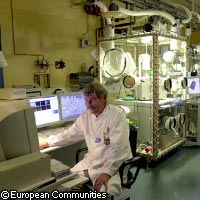JRC's on-site nuclear safety labs mark 10th anniversary
On 15 June, the European Commission's Joint Research Centre (JRC) Institute for Transuranium Elements (ITU) and Directorate-General for Energy, together with the International Atomic Energy Agency (IAEA), celebrated 10 years of monitoring the safety of reprocessed nuclear fuel in their on-site laboratories in Sellafield, UK and La Hague, France. The event, held at the JRC-ITU in Karlsruhe, Germany, gathered around 120 professionals working in the area of nuclear safeguards to discuss the latest developments in the field. The JRC operates laboratories at reprocessing plants in order to ensure the plants' compliance with nuclear safeguards and to avoid unnecessary transport. The nuclear materials processed in these plants represent 80% of the world's reprocessed spent fuel. The laboratories allow European Commission inspectors and JRC scientists to analyse samples more efficiently than was previously possible. Reprocessing spent nuclear fuel is a highly sensitive issue. Nuclear fuels are burned in power plants in such a way that their by-products cannot be used in the creation of weapons. But in order to get the most out of the fissile materials (e.g. uranium), the spent fuel must be reprocessed. This can only be done in such a way that, again, the new materials are of no use to anyone seeking to make weapons. Global security concerns, undeclared nuclear activities and political uncertainties with nations seeking to build nuclear power plants have made it more important than ever to track and safeguard nuclear materials. For facilities handling large amounts of nuclear material, this means putting measures in place to detect any diversion of materials as quickly as possible. 'Euratom Safeguards' are in place to verify that nuclear material in the EU is not diverted from its intended use, and that both the EU and other countries comply with specific safeguarding measures. The on-site laboratories were set up to make sure that the reprocessed nuclear materials can only be used for declared, peaceful purposes. 'Direct physical verification of the nuclear material at these reprocessing plants by JRC experts is fundamental to the ability for diversion detection,' stated JRC Director General Roland Schenkel. 'Appropriate international expertise and efforts are needed to better safeguard global fissile material stockpiles and to prevent illegal activities.' Every year, approximately 2,000 tonnes of spent fuel (equivalent to the consumption of 70 nuclear reactors) are reprocessed in Sellafield and La Hague. The JRC-ITU analyses around 800 samples every year. Once the samples are tested, Euratom inspectors evaluate the results. The JRC-ITU analysts work on site for more than 40 weeks per year, so the samples are taken at steady intervals. The samples are inventoried, which is important for 'nuclear accountancy'. Importantly, the analysts and inspectors check the samples independently of the plant operator. After 10 years of operation, the independent analyses performed at the on-site laboratories continue to play a crucial role in protecting the safety of the EU citizens. Inspectors' knowledge of novel detection techniques and equipment is needed to ensure that states abide by their non-proliferation commitments. The JRC provides training to Euratom and to the IAEA's safeguards inspectors. In addition, the JRC has helped set up a similar facility in Rokkasho, Japan, the only laboratory of its kind outside of the EU.
Countries
Germany, France, Japan, United Kingdom



